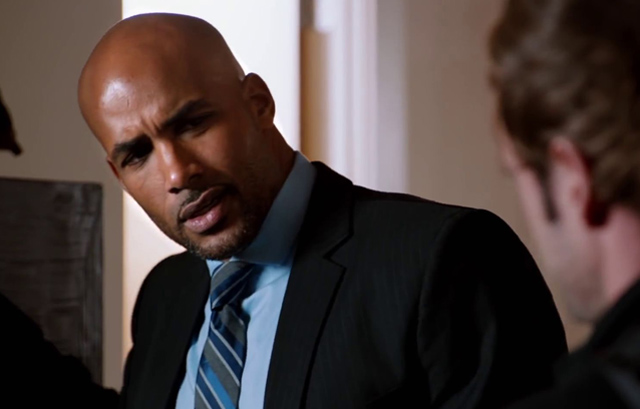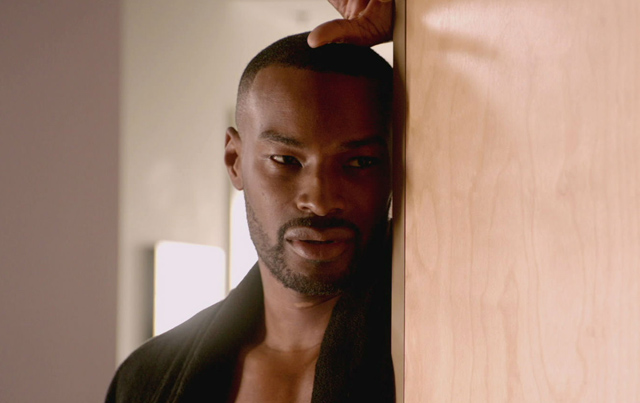CHICAGO – Patrick McDonald of HollywoodChicago.com appears on “The Morning Mess” with Dan Baker on WBGR-FM (Monroe, Wisconsin) on March 21st, 2024, reviewing the new streaming series “Manhunt” – based on the bestseller by James L. Swanson – currently streaming on Apple TV+.
Interview: Actors Tyson Beckford, Boris Kodjoe Become ‘Addicted’
CHICAGO – The stylings of author Zane, who has dominated the best seller list and pay cable networks for several years with her steamy and sensually oriented stories, gets to the big screen with the recently released “Addicted.” Actors Boris Kodjoe and Tyson Beckford are part of the ensemble cast.
“Addicted” is the story of Zoe (Sharon Leal), whose life seems perfect with her husband Jason (Boris Kodjoe) and three children. There is something missing from her life, however, and she begins a series of affairs with other men. This leads to an addiction with the thrill of the hunt and capture, and the number of conquests puts her on a dangerous path that could cost Zoe her husband, family and perhaps her life.

Boris Kodjoe in ‘Addicted’
Photo credit: Lionsgate
Boris Kodjoe is a former college athlete (tennis) who became a model and actor after a back injury sidelined his sports ambition. He broke into feature films with Gina Prince-Bythewood’s “Love & Basketball” (2000), and has worked steadily ever since, notably in “Resident Evil: Afterlife” (2010) and “Baggage Claim” (2013). Tyson Beckford is known more for his fashion modeling career, but had a memorable role in “Zoolander” (2001) that jump started his acting career. “Addicted” is his 13th feature film.
HollywoodChicago.com interview both performers, as they talked about the themes presented in “Addicted,” and the perception of African-American men in society.
HollywoodChicago.com: Given the subject matter of this story, what do you think of the fact that everybody’s individual desires are their Achilles heel, and that the societal structure of marriage and monogamy are against the grains of who we are as animals?
Boris Kodjoe: Nature versus nurture, that is a centuries long discussion. There are cultural issues involved here, even now we have some cultures practicing polygamy. My grandfather had eight wives in Ghana, Africa. So who are we to say what is right or wrong? I think the key to this question is to do what is right with your partner. If both of you are in accord as to how you will practice the relationship, then that leads to harmonious accord. If one thinks it’s okay to have multiple partners and the other does not, then there are problems.
It’s about communication. It’s important give each other the space and freedom to express what we need and want. It’s something you have to figure out whether you can live with, respect and still love.
HollywoodChicago.com: There are perceptions that the structures of marriage, fidelity and parenting have disintegrated to a degree within the African-American culture. What factors have you observed do you think have motivated that?
Kodjoe: There are socio-economic reasons. Americans in general have existential fears. When you have three or four jobs to support your family or survive, relationships come last. When that happens, people feel undervalued and taken advantage of, and then relationships start to splinter.
Tyson Beckford: It’s the little things…having meals together or helping your kid with homework. So much of that goes away when you’re a single parent hustling to pay the bills, not staying on top of what your kids are doing. Also the community doesn’t watch out for kids like they used to – if I rode my bike past where I was allowed to be, usually one of the neighbors would report back to my mother. [laughs] That’s changed, because kids are growing up differently now, and not interacting as much.

Tyson Beckford in ‘Addicted’
Photo credit: Lionsgate
HollywoodChicago.com: There is a difference between desiring someone and taking care of their emotional and intellectual state. How does that difference, in both of you opinions, either enhance or destroy those two sides of our coupling?
Kodjoe: I think it’s the question of the responsibility you feel for somebody else, and their emotional well-belng. There are one night stands, relationships, marriage – again it comes down to defining it for yourself, and giving your partner the right to do it as well. That is addressed in the film, because women in general don’t feel they have the freedom to do that, they feel like they’re being judged if they do that. And that is what causes many people’s secret lives, in trying to fulfill a certain fantasy.
HollywoodChicago.com: There has been a debate recently on the way that African-American men are treated in society, because of how laws have been structured today and in the past. What do you both think it will take for American society to get over the way this treatment is unfairly applied, or do you think the resentment it generates will just make it get worse?
Kodjoe: It starts with acceptance. You can’t tell a rape victim, for example, that you understand. That is the wrong beginning of the conversation. Because you don’t, and you can’t possibly understand because it hasn’t happened to you. So it begins with acceptance. You have to accept what a person has gone through, and how it manifests in problems that they are facing.
So for a white person to tell a black person that they understand is completely wrong. What they need to say is ‘I accept the fact that you are angry, that you’ve been scorned and scarred, please share with me what it is like.’ That is where it starts. And then we can have a conversation, close the gap and bridge the divide. It’s something to build on.
HollywoodChicago.com: What do you think of the assertion that we’re ‘post-racial’?
Kodjoe: I think it’s bullshit. It’s not true, and it’s most likely never to be true. There will always be racism and discrimination, because when we feel uncomfortable in our own skins, we have to judge somebody else. What I always suggest is to spread compassion and love. Let’s try that, and see if that can influence some people who weren’t about that before. The issue can’t be solved, but I want to influence my environment in a positive manner, love and compassion is my contribution.
Beckford: I saw that Hillary Clinton acknowledged that there is racism in America. For somebody who is potentially running for president, that is a good first step, to recognize that. She said that you can’t empathize with someone until you’ve lived in their skin.
HollywoodChicago.com: Tyson, models tend to have interesting stories of how they realized they would go into their profession. What was your story, did you realize you wanted to do it yourself or did someone encourage you to do so?
 Boris Kodjoe & Tyson Beckford in Chicago, Sept. 25, 2014 Photo credit: Patrick McDonald for HollywoodChicago.com |
Beckford: My mother actually encouraged me to get into the profession, I never wanted to do it. I was always more into acting. She pushed me into it, and modeling just took off more than acting initially, so I rolled with it. And now I’m going back to acting, and I’ve been satisfied with my career.
HollywoodChicago.com: Boris, you were in the classic ‘Love & Basketball,’ directed by Gina Prince-Bythewood. In your on-set experience, is there a way a woman director approaches story material that you find different than a male influence?
Kodjoe: First, everyone is different in their regard to individually approaching their art. Gina is very smart, and an excellent director, she’s meticulous and prepared. I like to make the distinction between a director who is prepared and one who goes with their gut. Somebody said in filmmaking, the only thing that doesn’t cost money is preparation. It makes for a smoother ride on set and it generates more trust with everyone.
HollywoodChicago.com: Tyson, you of course appeared in ‘Zoolander’, in which male models were reduced to some very funny stereotypes. Can you give an example in the real world of modeling that is as weird or funny as what was depicted in ‘Zoolander’?
Beckford: The ‘Blue Steel’ pose is real, Ben Stiller just gave it a name. Every model has those type of expressions, and they go to them. It was my first big film, and it got mixed up in the post 9/11 stuff [shots of the World Trade Center had to be digitally erased from the film]. Everything surrounding the junkets and press were cancelled, so I never got to experience the boost of the moment. But it still lasts to this day, because it’s so funny.
 | By PATRICK McDONALD |


